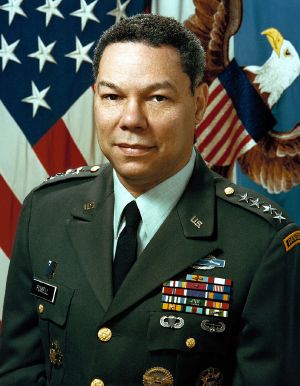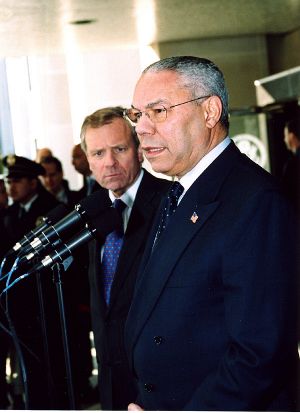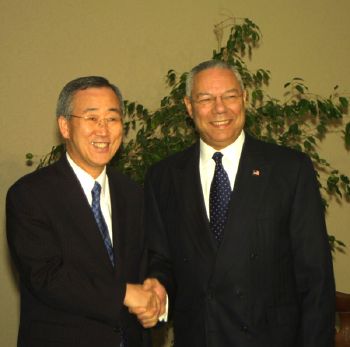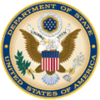Colin Powell
| Colin Luther Powell | |
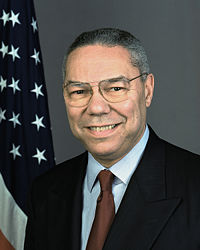 | |
12th Chairman of the Joint Chiefs of Staff
| |
|---|---|
| In office October 1, 1989 – September 30, 1993 | |
| Under President | George H. W. Bush Bill Clinton |
| Preceded by | William J. Crowe |
| Succeeded by | David E. Jeremiah |
16th National Security Advisor
| |
| In office November 23, 1987 – January 20, 1989 | |
| Under President | Ronald Reagan |
| Preceded by | Frank Carlucci |
| Succeeded by | Brent Scowcroft |
| Born | April 5 1937 (age 87) New York City, New York, U.S.A. |
| Died | October 18 2021 (aged 84) Bethesda, Maryland |
| Political party | Republican |
| Spouse | Alma Vivian Johnson Powell |
| Profession | Soldier Statesman |
| Religion | Episcopalian |
Colin Luther Powell, KCB, MSC, (April 5, 1937 - October 18, 2021) was an American statesman and a former four-star general in the United States Army. He was the sixty-fifth United States Secretary of State (2001-2005), serving under President George W. Bush. He was the first African American appointed to that position. During his military career, Powell also served as National Security Adviser (1987–1989), as Commander-in-Chief, U.S. Army Forces Command (1989), and as Chairman of the Joint Chiefs of Staff (1989–1993), holding the latter position during the Gulf War. He was the first, and so far the only, African American to serve on the Joint Chiefs of Staff.
History will probably be kind in remembering Powell, who, despite his mistake in telling the world that the invasion of Iraq was justified and legal on the grounds that Saddam Hussein had weapons of mass destruction, retained a reputation for integrity. Having backed the war in Iraq against his own better judgment, he since described the data as "dead wrong." As a soldier, he knew that war must always be the measure of last resort. As a diplomat he rarely advocated military intervention as the first solution to an international crisis, instead prescribing negotiation and containment. Not all leaders have the grace and humility to admit that they have made a mistake. Powell's openness and honesty placed him in a rare category of public servants who hold themselves accountable for their stewardship of the public trust.
Life
Colin Luther Powell was born on April 5, 1937 in Harlem, a neighborhood in the New York City borough of Manhattan in 1937 to Jamaican immigrant parents Luther Theophilus Powell and Maud Arial McKoy and was raised in the South Bronx. He also has Scottish and Irish ancestry. Powell attended Morris High School, a former public school in The Bronx, New York City, from which he graduated in 1954. While in school, he worked a local shop where he picked up Yiddish from the shopkeepers and some of the customers.
He earned a bachelor's degree in geology from City College of New York, attaining only a C average, according to his 2006 graduation address at Marymount University. He earned an MBA from The George Washington University, after his second tour in Vietnam in 1971.
In 1962, he married Alma Johnson Powell, who is now the co-chair of America's Promise. He is the father of Michael Powell, former chair of the Federal Communications Commission.
On October 18, 2021, Powell, who was being treated for multiple myeloma, died at Walter Reed National Military Medical Center of complications from COVID-19 at the age of 84.[1] He had been vaccinated, but the treatment for multiple myeloma had compromised his immune system.[2]
Military career
Powell joined the Reserve Officers' Training Corps at City College and later described it as one of the happiest experiences of his life; discovering something he loved and could do well, he felt he had "found himself." Cadet Powell joined the Pershing Rifles, the ROTC fraternal organization and drill team begun by General John Pershing. Even after he had become a General, Powell kept on his desk a pen set he had won for a drill-team competition. Graduating from City College in June 1958, he received a commission as an Army second lieutenant. He was a professional soldier for 35 years, holding a variety of command and staff positions and rising to the rank of general.
While serving with the Third Armored Division in Germany as a lieutenant, he met Elvis Presley, who was serving in that unit. Powell was a captain during the Vietnam War, serving as a South Vietnamese Army adviser from 1962 to 1963. While on patrol in a Viet Cong-held area, he was wounded by stepping on a punji stake.
He returned to Vietnam as a major in 1968, serving in the Americal Division (23rd Infantry Division), then as assistant chief of staff of operations for the Americal Division. He was charged with investigating a detailed letter by Tom Glen (a soldier from the 11th Light Infantry Brigade), which backed up rumored allegations of the My Lai Massacre. Powell wrote: "In direct refutation of this portrayal is the fact that relations between American soldiers and the Vietnamese people are excellent." Later, Powell's assessment would be described as whitewashing the news of the massacre, and questions would continue to remain undisclosed to the public. In May 2004, Powell said to Larry King, "I mean, I was in a unit that was responsible for My Lai. I got there after My Lai happened. So, in war, these sorts of horrible things happen every now and again, but they are still to be deplored." Powell served a White House fellowship, a highly selective and prestigious position, under President Richard Nixon from 1972 to 1973.
In his autobiography, My American Journey, Powell named several officers he served under that inspired and mentored him. As a lieutenant colonel serving in South Korea, Powell was very close to General Henry "Gunfighter" Emerson. Powell said he regarded Emerson as one of the most caring officers he ever met. Emerson reputedly had an eccentric personality. For example, he insisted his troops train only at night and made them repeatedly watch the television film Brian's Song to promote racial harmony. Powell always professed, however, that what set Emerson apart was his great love of his soldiers and concern for their welfare.
In the early 1980s, Powell served at Fort Carson, Colorado. It was there that he had a major clash with General John Hudachek, his commander. Hudachek said in an efficiency evaluation that Powell was a poor leader who should not be promoted. Powell's rising military career was unhindered by Hudachek's evaluation report. After he left Fort Carson, Powell became senior military assistant to Secretary of Defense Caspar Weinberger, whom he assisted during the 1983 invasion of Grenada and the 1986 airstrike on Libya.
In 1986, he took over the command of V Corps in Frankfurt, Germany, from Robert Lewis "Sam" Wetzel. In 1989, prior to being named Chairman of the Joint Chiefs of Staff, Powell served as the Commander in Chief, Forces Command headquartered at Fort McPherson, Georgia.
Dates of rank
- Second Lieutenant: June 9, 1958
- First Lieutenant: December 30, 1959
- Captain: June 2, 1962
- Major: May 24, 1966
- Lieutenant Colonel: July 9, 1970
- Colonel: February 1, 1976
- Brigadier General: June 1, 1979
- Major General: August 1, 1983
- Lieutenant General: March 26, 1986
- General: April 4, 1989
National Security Advisor
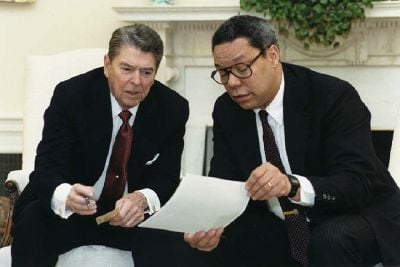
At the age of 49, Powell became Ronald Reagan's National Security Advisor, serving from 1987 to 1989 while retaining his Army commission as a lieutenant general. After his tenure with the National Security Council, Powell was promoted to a full general under President George H.W. Bush and briefly served as Commander-in-Chief (CINC) of the Army's Forces Command (FORSCOM), overseeing all Army, Army Reserve, and National Guard units in the Continental U.S., Alaska, Hawaii, and Puerto Rico.
Chairman of the Joint Chiefs of Staff
His last military assignment, from October 1, 1989 to September 30, 1993, was as the twelfth Chairman of the Joint Chiefs of Staff, the highest military position in the Department of Defense. At age 52, he became the youngest officer, and first Afro-Caribbean American, to serve in this position. In 1989, he joined Dwight D. Eisenhower and Alexander Haig as the third general since World War II to reach four-star rank without ever being a divisional commander. Powell was one of very few JCS Chairs who was not a collegiate graduate of a United States Service academy.
During this time, he oversaw 28 crises, including the invasion of Panama in 1989 to remove General Manuel Noriega from power and Operation Desert Storm in the 1991 Persian Gulf War. During these events, Powell earned his nickname, "the reluctant warrior." He rarely advocated military intervention as the first solution to an international crisis, and instead usually prescribed diplomacy and containment.
In his autobiography, Powell said he is haunted by the nightmare of the Vietnam War and felt that the leadership was very ineffective. Powell served a tour in Vietnam as a military adviser, and was mildly injured when he stepped on a bamboo "punji stick." The large infection made it difficult for him to walk, and caused his foot to swell for a short time, shortening his first tour. It was also during his Vietnam service, his second tour, that Powell was decorated for bravery. He single-handedly rescued several men from a burning helicopter, one of them being Maj. Gen. Charles Gettys, the commander of the Americal Division.
Additionally, Powell has been critical of other instances of U.S. foreign policy in the past, such as its support for the 1973 Chilean coup d'état. From two separate interviews in 2003, Powell stated in one about the 1973 event "I can't justify or explain the actions and decisions that were made at that time. It was a different time. There was a great deal of concern about Communism in this part of the world. Communism was a threat to the democracies in this part of the world. It was a threat to the United States."[3] In another interview, however, he also simply stated "With respect to your earlier comment about Chile in the 1970s and what happened with Mr. Allende, it is not a part of American history that we're proud of."[3]
Powell opposed the majority of George H.W. Bush Administration officials who advocated the deployment of troops to the Middle East to force Iraqi leader Saddam Hussein to withdraw his armies from neighboring Kuwait, believing the dictator could instead be contained through sanctions and a buildup of forces around Kuwait.
As a military strategist, Powell has advocated an approach to military conflicts that maximizes the potential for success and minimizes casualties. A component of this approach is the use of overwhelming force, which he applied to Operation Desert Storm in 1991. His approach has been dubbed the "Powell Doctrine."
Colin Powell's experience in military matters made him a very popular figure with both American political parties. Many Democrats admired his moderate stance on military matters, while many Republicans saw him as a great asset associated with the successes of past Republican administrations. Put forth as a potential Democratic Vice Presidential nominee in the 1992 U.S. Presidential Election, Powell defeated Bill Clinton 50-38 in a hypothetical match-up proposed to voters in the exit polls conducted on Election Day. Despite not standing in the race, Powell won the New Hampshire Vice-Presidential primary on write-in votes.
In 1997, Powell founded America's Promise with the objective of helping children from all socioeconomic sectors. Powell often wears the logo of the organization in the form of a red wagon pin on his lapel.
In the 2000 U.S. Presidential Election Powell campaigned for Senator John McCain and later Texas Governor George W. Bush, after the latter secured the Republican nomination, serving as a key foreign policy advisor to the Bush campaign. Bush eventually won, and Colin Powell was appointed Secretary of State.
Secretary of State
As Secretary of State in the Bush administration, Powell was perceived as moderate. Powell's great asset was his tremendous popularity among the American people. Powell was unanimously voted in by the United States Senate. Over the course of his tenure, he traveled less than any other U.S. Secretary of State in 30 years.
On September 11, 2001, Powell was in Lima, Peru, meeting with President Alejandro Toledo and U.S. Ambassador to Peru John Hamilton, and attending the special session of the OAS General Assembly that subsequently adopted the Inter-American Democratic Charter.
After September 11, Powell's job became of critical importance in managing America's relationships with foreign countries in order to secure a stable coalition in the War on Terrorism.
In April 2002, he visited the site of the alleged Jenin Massacre in the West Bank and later said while testifying to Congress, "I've seen no evidence that would suggest a massacre took place." Details of the events were unclear at the time. Shimon Peres was quoted by Ha'aretz speaking of a massacre and IDF estimates of the dead were in the hundreds. Later investigations by human rights organizations and the United Nations placed the number of deaths among Palestinians at 52.
Powell came under fire for his role in building the case against the 2003 Invasion of Iraq. In a press statement on February 24, 2001 he had said that sanctions against Iraq had prevented the development of any weapons of mass destruction by Saddam Hussein. As was the case in the days leading up to the Persian Gulf War, Powell was initially opposed to a forcible overthrow of Hussein, preferring to continue a policy of containment. However, Powell eventually agreed to go along with the Bush administration's determination to remove Hussein. He had often clashed with others in the administration, who were reportedly planning an Iraq invasion even before the September 11 attacks—an insight supported by testimony by former terrorism czar Richard Clarke in front of the 9/11 Commission. The main concession Powell wanted before he would offer his full support for the Iraq War was the involvement of the international community in the invasion, as opposed to the unilateral approach some advocated. He was also successful in persuading Bush to take the case of Iraq to the United Nations, and in moderating other initiatives. Powell was placed at the forefront of this diplomatic campaign.
Powell's chief role was to garner international support for a multi-national coalition to mount the invasion. To this end, Powell addressed a plenary session of the United Nations Security Council on February 5, 2003 to argue in favor of military action. Citing numerous anonymous Iraqi defectors, Powell asserted that "there can be no doubt that Saddam Hussein has biological weapons and the capability to rapidly produce more, many more." Powell also stated that there was "no doubt in my mind" that Saddam was working to obtain key components to produce nuclear weapons.
Most observers praised Powell's oratorical skills. However, Britain's Channel 4 News reported soon afterwards that a UK intelligence dossier that Powell had referred to as a "fine paper" during his presentation had been based on old material and plagiarized an essay by an American graduate student.[4] A 2004 report by the Iraq Survey Group concluded that the evidence that Powell offered to support the allegation that the Iraqi government possessed weapons of mass destruction (WMDs) was inaccurate.
A Senate report on intelligence failures would later detail the intense debate that went on behind the scenes on what to include in Powell's speech. State Department analysts had found dozens of factual problems in drafts of the speech. Some of the claims were taken out, but others were left in, such as claims based on the yellowcake forgery.[5] The administration came under fire for having acted on faulty intelligence. Reports have indicated that Powell himself was skeptical of the evidence presented to him. Powell later recounted how Vice President Cheney had joked with him before he gave the speech, telling him, "You've got high poll ratings; you can afford to lose a few points." Larry Wilkerson later characterized Cheney's view of Powell's mission as to "go up there and sell it, and we'll have moved forward a peg or two. Fall on your damn sword and kill yourself, and I'll be happy, too."[6]
In September 2005, Powell was asked about the speech during an interview with Barbara Walters and responded that it was a "blot" on his record. He went on to say, "It will always be a part of my record. It was painful. It's painful now."[7]
Because Powell was seen as more moderate than most figures in the administration, he was spared many of the attacks that have been leveled at more controversial advocates of the invasion, such as Donald Rumsfeld and Paul Wolfowitz. At times, infighting among the Powell-led State Department, the Rumsfeld-led Defense Department, and Vice President Dick Cheney's office had the effect of polarizing the administration on crucial issues, such as what actions to take regarding Iran and North Korea.
After Saddam Hussein had been deposed, Powell's new role was to once again establish a working international coalition, this time to assist in the rebuilding of post-war Iraq. On September 13, 2004, Powell testified before the Senate Governmental Affairs Committee, acknowledging that the sources who provided much of the information in his February 2003 UN presentation were "wrong" and that it was "unlikely" that any stockpiles of WMDs would be found. Claiming that he was unaware that some intelligence officials questioned the information prior to his presentation, Powell pushed for reform in the intelligence community, including the creation of a national intelligence director who would assure that "what one person knew, everyone else knew."
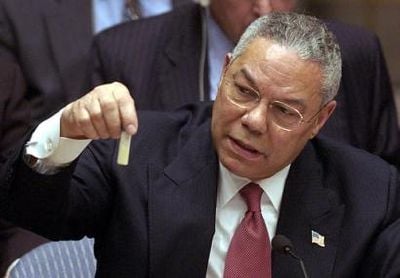
Colin Powell announced his resignation as Secretary of State on Monday, November 15, 2004. According to the Washington Post, he had been asked to resign by the president's chief of staff, Andrew Card.[6] Powell announced that he would stay on until the end of Bush's first term or until his replacement's confirmation by Congress. The following day, George W. Bush nominated National Security Advisor Condoleezza Rice as Powell's successor. News of Powell's leaving the Administration spurred mixed reactions from politicians around the world—some upset at the loss of a statesman seen as a moderating factor within the Bush administration, but others hoping for Powell's successor to wield more influence within the cabinet, and thus be a more credible negotiator.
In mid-November, Colin Powell stated that he had seen new evidence suggesting that Iran was adapting missiles for a nuclear-delivery system.[8] The accusation came at the same time as the settlement of an agreement between the IAEA, the European Union, and Iran.
Life after diplomatic service
After retiring from the role of Secretary of State, Powell returned to private life. In April 2005, he was privately telephoned by Republican senators Lincoln Chafee and Chuck Hagel, at which time Powell expressed reservations and mixed reviews about the nomination of John R. Bolton as ambassador to the United Nations, but refrained from advising the senators to oppose Bolton (Powell had clashed with Bolton during Bush's first term). The decision was viewed as potentially dealing significant damage to Bolton's chances of confirmation. Bolton was put into the position via a recess appointment because of the strong opposition in the Senate.
On April 28, 2005, an opinion piece in the The Guardian by Sidney Blumenthal (a former top aide to President Bill Clinton) claimed that Powell was in fact "conducting a campaign" against Bolton because of the acrimonious battles they had had while working together, which among other things had resulted in Powell cutting Bolton out of talks with Iran and Libya after complaints about Bolton's involvement from the British. Blumenthal added that "The foreign-relations committee has discovered that Bolton made a highly unusual request and gained access to ten intercepts by the National Security Agency. Staff members on the committee believe that Bolton was probably spying on Powell, his senior advisors and other officials reporting to him on diplomatic initiatives that Bolton opposed."[9]
In September 2005, Powell criticized the response to Hurricane Katrina.[10] Powell said that thousands of people were not properly protected, but because they were poor rather than because they were black.
On January 5, 2006, he participated in a meeting at the White House of former Secretaries of Defense and State to discuss United States foreign policy with Bush administration officials. In September 2006, Powell sided with more moderate Senate Republicans in supporting more rights for detainees and opposing President Bush's terrorism bill. He backed Senators John Warner, John McCain, and Lindsey Graham in their statement that U.S. military and intelligence personnel in future wars will suffer for abuses committed in 2006 by the U.S. in the name of fighting terrorism. Powell stated that "The world is beginning to doubt the moral basis of [America's] fight against terrorism."[11]
Also in 2006, Powell began appearing as a speaker at a series of motivational events called Get Motivated, along with former New York Mayor Rudy Giuliani. In his speeches for the tour, he openly criticized the Bush Administration on a number of issues.
He joined the Board of Directors of Steve Case's company Revolution Health, and also served on the Council on Foreign Relations Board of directors.
Powell encouraged young people to continue to use new technologies to their advantage in the future. In a speech at the Center for Strategic and International Studies to a room of young professionals, he encouraged the next generation to involve themselves politically on the upcoming Next America Project, which uses online debate to provide policy recommendations for the upcoming administration.
In 2008, Powell served as a spokesperson for National Mentoring Month, a campaign held each January to recruit volunteer mentors for at-risk youth.
Soon after President Barack Obama's 2008 election, Powell began being mentioned as a possible cabinet member. He was not nominated.
Political views
A moderate Republican, Powell is well known for his willingness to support liberal or centrist causes. He is pro-choice regarding abortion, and in favor of "reasonable" gun control. Powell stated in his autobiography that he supports affirmative action that levels the playing field, without giving a leg up to undeserving persons because of racial issues. He was also instrumental in the implementation of the military's Don't ask, don't tell policy.
The Vietnam War had a profound effect on Powell's views of the proper use of military force. These views are described in detail in the autobiography My American Journey. The Powell Doctrine, as the views became known, was a central component of U.S. policy in the Gulf War (the first U.S. war in Iraq) and the U.S. invasion of Afghanistan (the overthrow of the Taliban regime in Afghanistan following the events of 9/11). The hallmark of both operations was strong international cooperation, and the use of overwhelming military force.
In a letter to Sen. John McCain, General Powell expressed opposition to President Bush's push for military tribunals of those formerly and currently classified as enemy combatants. Specifically, he expressed concern of Bush's plan to "amend the interpretation of Article III of the Geneva Conventions." He also pointed out that perception of the War on Terror may be losing moral support saying, "The world is beginning to doubt the moral basis of our fight against terrorism."
View of the U.S. war in Iraq
In an interview in July 2007, Powell revealed that he had spent two and a half hours trying to persuade George W. Bush not to invade Iraq but that he did not prevail. At the Aspen Ideas Festival in Colorado Powell stated, "I tried to avoid this war. I took him [Bush] through the consequences of going into an Arab country and becoming the occupiers."[12]
Powell went on to say that he believed Iraq was in a state of civil war. "The civil war will ultimately be resolved by a test of arms. It's not going to be pretty to watch, but I don't know any way to avoid it. It is happening now." He further noted, "It is not a civil war that can be put down or solved by the armed forces of the United States," and suggested that all the U.S. military could do was put "a heavier lid on this pot of boiling sectarian stew."[12]
Role in presidential election of 2008
Powell donated the maximum amount to John McCain's campaign in the summer of 2007 and in early 2008, his name was listed as a possible running mate for Republican nominee McCain's bid during the 2008 U.S. presidential election. However, on October 19, 2008, Powell announced his endorsement of Barack Obama during a Meet the Press interview, citing "his ability to inspire, because of the inclusive nature of his campaign." He additionally referred to Obama as a "transformational figure."[13]
Powell further questioned Senator John McCain's judgment in appointing Sarah Palin as the vice-presidential candidate, stating that despite the fact that she is admired, "now that we have had a chance to watch her for some seven weeks, I don't believe she's ready to be president of the United States, which is the job of the vice president." He pointed out how he thought Barack Obama's choice for vice-president, Joe Biden was ready to be president. He also added that he was "troubled" by the "false intimations that Obama was Muslim." Powell stated that "[Obama] is a Christian—he's always been a Christian…," and continued, "But the really right answer is, what if he is? Is there something wrong with being a Muslim in this country? The answer's no, that's not America." Powell then referenced Kareem Rashad Sultan Khan, a Muslim American soldier in the U.S. Army who served and died in the Iraq War. He later stated, "Over the last seven weeks, the approach of the Republican Party has become narrower and narrower […] I look at these kind of approaches to the campaign, and they trouble me." [14]
Legacy
Besides serving in a number of key military, governmental, and private positions throughout his long and storied career, Colin Powell was also the first and so far only African American to serve on the Joint Chiefs of Staff, as well as the first African American U.S. Secretary of State. But beyond these powerful positions, Powell also had an equally strong reputation as a man of integrity, a man of his word. When Colin Powell said something, you knew he meant it.
Recognition
Powell's civilian awards include two Presidential Medals of Freedom, the President's Citizens Medal, the Congressional Gold Medal, the Secretary of State Distinguished Service Medal, the Secretary of Energy Distinguished Service Medal, and the Ronald Reagan Freedom Award. Several schools and other institutions have been named in his honor and he holds honorary degrees from universities and colleges across the country.
In 1991, Powell was inducted into the Horatio Alger Association of Distinguished Americans, which "honors the achievements of outstanding individuals in U.S. society who have succeeded in spite of adversity and of encouraging young people to pursue their dreams through higher education." On November 9, 1993, Powell was awarded the second Ronald Reagan Freedom Award, by President Ronald Reagan. Powell served as Reagan's National Security Advisor from 1987-1989. On November 15, 1993, Colin Powell was made an honorary Knight Commander of the Order of the Bath by Queen Elizabeth II of the United Kingdom.
In 1998, he was awarded the prestigious Sylvanus Thayer Award by the United States Military Academy for his commitment to the ideals of "Duty, Honor, Country." In 2005, Colin and Alma Powell were awarded the Woodrow Wilson Award for Public Service by the Woodrow Wilson International Center for Scholars of the Smithsonian Institution.
Notes
- ↑ Amanda Macias, Colin Powell, former secretary of State who made case for Iraq invasion, dies of Covid complications at 84 CNBC, October 18, 2021. Retrieved October 18, 2021.
- ↑ Eric Schmitt, Colin Powell, Who Shaped U.S. National Security, Dies at 84 The New York Times, October 18, 2021. Retrieved October 18, 2021.
- ↑ 3.0 3.1 Remarks at the 2003 Groundhog Job Shadow Day Program, Secretary Colin L. Powell, Remarks and question and answer session with students, Washington, DC, January 31, 2003, excerpt on 1973 Chile coup, Federation of American Scientists. fas.org. Retrieved December 21, 2021.
- ↑ UK accused of lifting dossier text CNN, February 7, 2003. Retrieved December 21, 2021.
- ↑ Greg Miller, Flaws Cited in Powell's U.N. Speech on Iraq Los Angeles Times, July 15, 2004. Retrieved December 21, 2021.
- ↑ 6.0 6.1 Karen DeYoung, Falling on His Sword: Colin Powell's most significant moment turned out to be his lowest The Washington Post, October 1, 2006. Retrieved December 21, 2021.
- ↑ Colin Powell on Iraq, Race, and Hurricane Relief ABC News, January 6, 2006. Retrieved December 20, 2021.
- ↑ Elaine Sciolino, Exiles Add to Claims on Iran Nuclear Arms The New York Times, November 18, 2004. Retrieved December 21, 2021.
- ↑ Sidney Blumenthal, The good soldier's revenge The Guardian, April 28, 2005. Retrieved December 21, 2021.
- ↑ Powell criticises storm response BBC News, September 9, 2005. Retrieved December 21, 2021.
- ↑ Senators defy Bush on tribunals BBC News, September 15, 2006. Retrieved December 21, 2021.
- ↑ 12.0 12.1 Sarah Baxter, Powell tried to talk Bush out of war The Sunday Times, July 8, 2007. Retrieved December 21, 2021.
- ↑ Colin Powell endorses Obama. CNN. Retrieved December 21, 2021.
- ↑ Powell: Support for Obama doesn't mean Iraq war wrong CNN. Retrieved December 21, 2021.
ReferencesISBN links support NWE through referral fees
- DeYoung, Karen. Soldier: The Life of Colin Powell. New York, NY: Alfred A. Knopf, 2006. ISBN 1400041708
- Harari, Oren. The Leadership Secrets of Colin Powell. New York, NY: McGraw-Hill, 2002. ISBN 9780071388597
- Means, Howard B. Colin Powell: Soldier/Statesman—Statesman/Soldier. New York, NY: D.I. Fine, 1992. ISBN 9781556113352
- Powell, Colin A., and Joseph Persico. My American Journey. New York, NY: Ballantine Books, 1995. ISBN 0345407288
External links
All links retrieved January 7, 2024.
- Colin Powell The New York Times
- Complete text, audio, video of Colin Powell's Remarks to the UN Security Council AmericanRhetoric.com.
- Colin Powell at "On the issues".
- THE RECORD ON CURVEBALL: Declassified Documents and Key Participants Show the Importance of Phony Intelligence in the Origins of the Iraq War.
- Colin Powell Quotes.
- William J. Clinton Remarks on the Retirement of General Colin Powell in Arlington, Virginia The American Presidency Project.
| |||||||
Credits
New World Encyclopedia writers and editors rewrote and completed the Wikipedia article in accordance with New World Encyclopedia standards. This article abides by terms of the Creative Commons CC-by-sa 3.0 License (CC-by-sa), which may be used and disseminated with proper attribution. Credit is due under the terms of this license that can reference both the New World Encyclopedia contributors and the selfless volunteer contributors of the Wikimedia Foundation. To cite this article click here for a list of acceptable citing formats.The history of earlier contributions by wikipedians is accessible to researchers here:
The history of this article since it was imported to New World Encyclopedia:
Note: Some restrictions may apply to use of individual images which are separately licensed.
